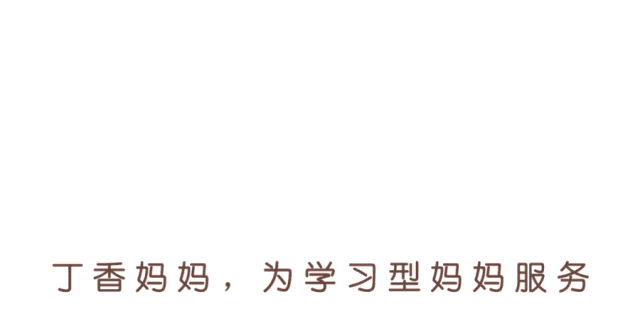
Some time ago, we sent an article about constipation. A mother shared her experience:
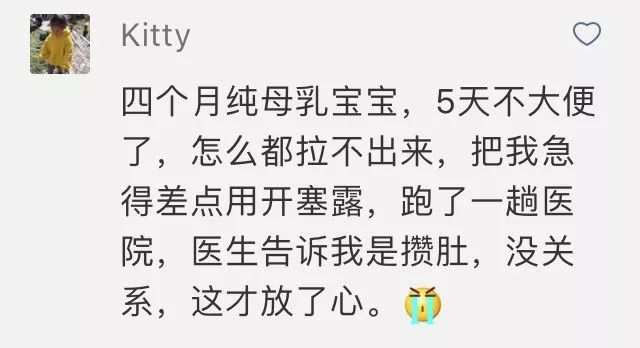
After becoming a mother, the baby’s excrement, urine and fart have become the top priority of the whole family. Counting the number of times the baby poops is simply the daily standard for mothers.
If the baby doesn’t stink for a few days, the parents must be worried: is it normal not to stink for 5 days? Are you constipated? What should I do?

Baby defecates abnormally
First judge whether it is constipation,
If the baby does not poop for a few days, it is not necessarily constipation. If you suspect that the baby is constipated, it is best to strictly observe whether the baby has the following symptoms:
- Newborns, older babies with hard stool less than once a day (except some exclusively breast-fed babies), The stool quality is hard, 3 ~ 4 days before a defecation occurs for children of what age. The stool volume is large, dry and hard, defecation is difficult and laborious, accompanied by abdominal pain. After a relatively large amount of defecation, abdominal pain relieves blood on the surface or inside of the stool in a short time.
If the baby has the above situation, constipation may occur and medical treatment should be required when necessary. However, the baby does not stink for a few days, besides constipation, it may also be stomach saving.There is no need for medical treatment and drug intervention to save the belly, so the precious mothers do not need to be anxious and worried.How to distinguish whether the baby has a stomach or constipation?
The following small chart can help Baoma to make a preliminary judgment:
In the meantime, it is necessary to
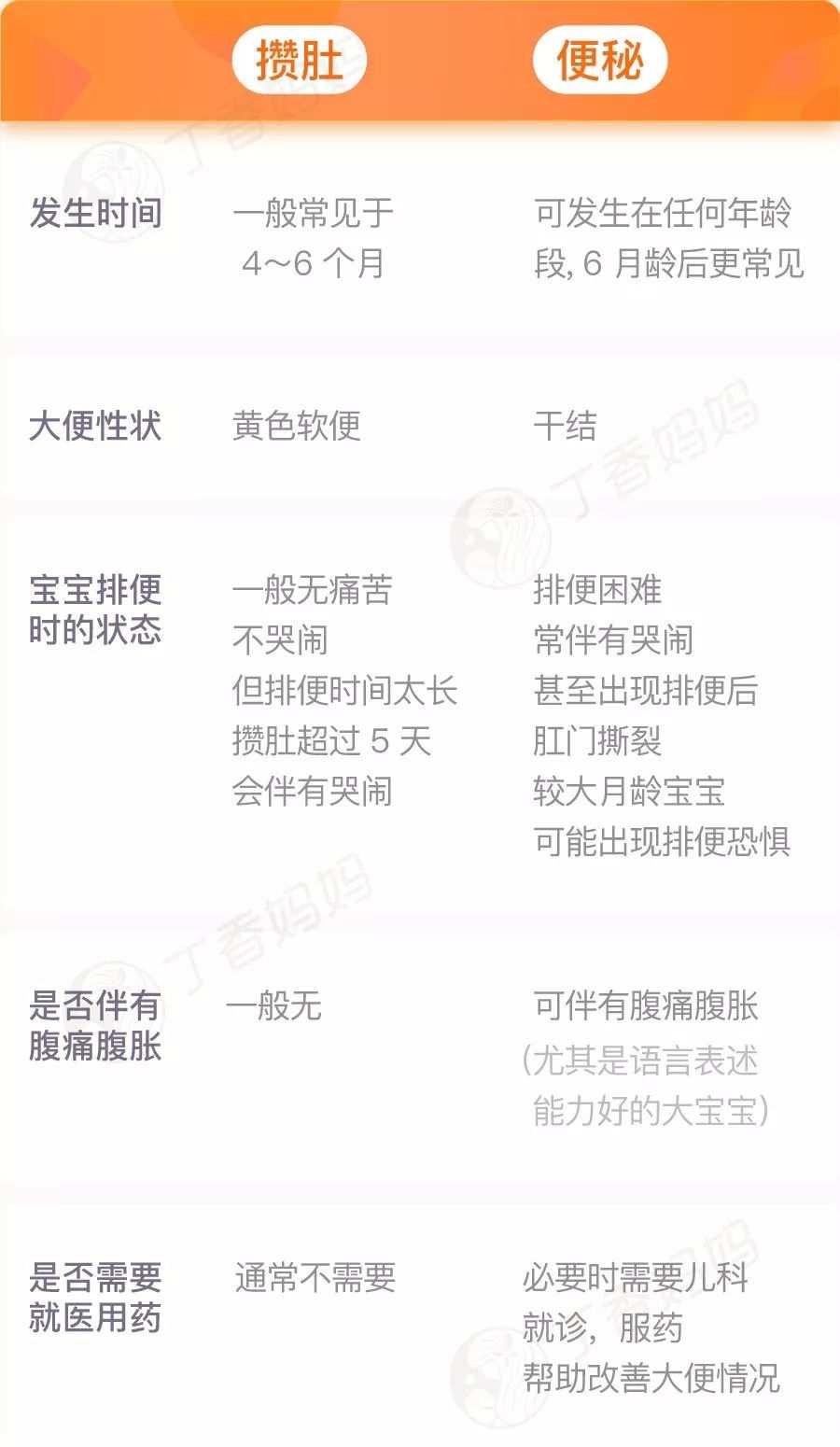
In short, the main difference between stomach saving and constipation is not the length of defecation interval, but whether the baby has dry stool and whether the baby has difficulty defecating.
Of course, if the two situations are not in line, the baby just short time defecation frequency is reduced, poop is normal, mothers don’t need to worry. Moreover, the baby has saved up the belly, and the mother doesn’t need to worry too much, saving up the belly generally doesn’t need treatment. However, the baby is constipated, and parents should take measures.

Baby constipation, how to do?
If the baby is really constipated, don’t worry, for different stages of the baby, take corresponding measures.
1. Exclusively breast-fed babies (0 ~ 6 months old)
The moisture content in breast milk is high, and the baby who is exclusively breast-fed seldom suffers from constipation. If constipation occurs at this stage, the relationship between constipation and diet is not too big. The mother should consult a pediatrician, whether she needs medical treatment or whether she can feed water to the baby, etc., and do not give the baby water and medicine without authorization.
2. Babies with supplementary foods (over 6 months old)
1. Increase the intake of fat and dietary fiber
To treat constipation, we should start with diet, ensure sufficient water intake, appropriately increase the intake of fat and dietary fiber, and properly intake meat. Supplementary foods for small-month-old babies with constipation can be appropriately biased towards vegetable puree and fruit puree.
After the baby can eat some fresh fruits and vegetables, he can eat more vegetables and fruits every day. In fruits, prune, avocado and pear have higher dietary fiber content.
Among vegetables, broccoli, peas and cooked lentils are also good helpers to relieve constipation. Older constipation babies can eat more appropriately.
Note: Bananas are not fruits with high dietary fiber content, and the laxative effect is not good.
Raw bananas taste astringent and contain more [tannic acid]. This substance can reduce gastrointestinal peristalsis. If the baby eats too much, it will not only have no effect, but may aggravate constipation.
Of course, foods with high dietary fiber content should be matched with children and should not be eaten too much every day.
For example, eat one avocado every day and add half a cup of prune. After 1-2 days, observe the child’s stool. If it becomes soft, continue to eat it like this. If it is still hard, add a little more. If it is already thin, reduce the amount.
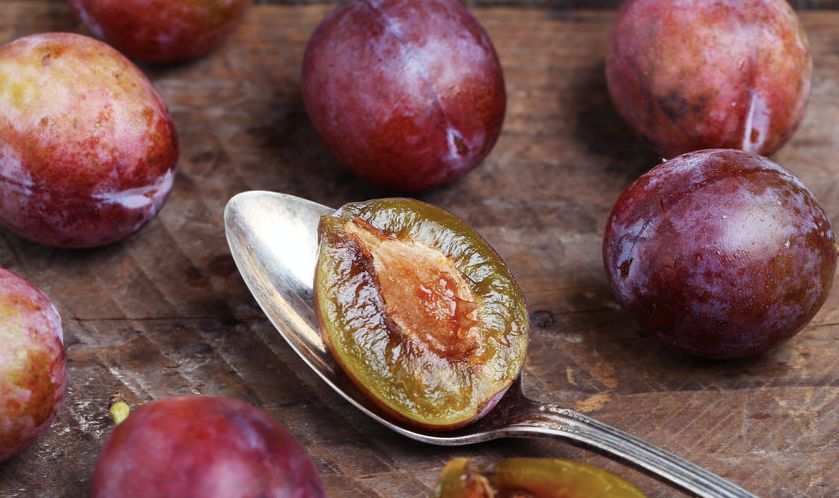
2. Ensure that the baby has enough activities,
For children under the age of 2, let the children play in the fields more, and there is no specific need to play for long. If the baby cannot play in the fields, he can help promote the baby’s gastrointestinal peristalsis through passive exercise and passive turning over.
Children are encouraged to climb more and walk more on the ground. They can also run and jump slightly and interact with other children, such as building blocks.
For children aged 2-5 years old, it is currently recommended to have at least one hour of activities per day. It is recommended to give priority to outdoor activities and games, such as walking, playing and chasing, running, cycling, etc.
The standard for proper exercise is that the child will not feel tired and will be energetic the next day after a night’s rest.

Step 3: Touch and massage
When the baby’s abdominal distension is not timely, parents can massage the baby clockwise around the navel, exert a little force on the hand and press down 0.5 cm to help the baby relieve discomfort and promote defecation.
Step 4: Supplement appropriate amount of prebiotics
Prebiotics can hardly be digested and absorbed by our intestines. However, it can be utilized by beneficial bacteria in the intestinal tract to promote their growth and activity, help the reproduction of beneficial bacteria in the intestinal tract and improve the intestinal microenvironment. Some milk powder also adds prebiotics to help reduce the burden on the baby’s intestinal tract, allowing the baby to naturally ingest prebiotics while drinking milk, without additional feeding, which is relatively more convenient.
-Advertising-
Huanxin upgraded Meisujiaer contains breakthrough PureGOS ™ pure prebiotics, which helps reduce the absorption burden of the baby, provides a mild environment for the intestines and stomach, protects the delicate intestines and stomach of the baby, and helps the baby grow healthily.
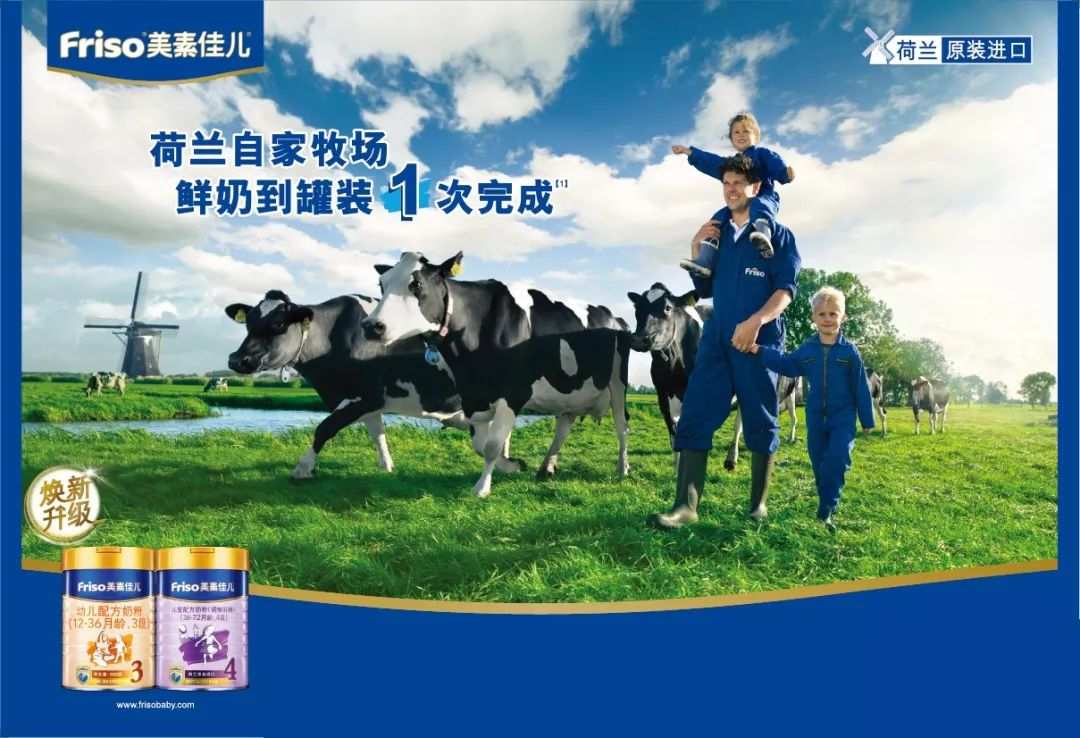
Meisujiaer comes from his own pasture in Holland. Farmers from generation to generation feed cows in a natural way to ensure that every drop of fresh milk is of high quality.
After collecting high-quality fresh milk that meets the standard, Meisujiaer adopts the whole process of 4 ℃ cold chain transportation, and the fresh milk is directly sent to the factory for production and processing to retain the precious nutrition in the fresh milk to the greatest extent.
After arriving at the factory, the fresh milk goes through various strict tests and only goes through one time control and temperature control processing procedure. The fresh milk is canned once, thus reducing the polymerization of protein molecules, locking up natural nutritional small molecules ([small molecules] i.e. Low polymerization and low saccharification protein reactants) to the maximum extent, protecting the baby’s delicate intestines and stomach, and helping to reduce the metabolic burden of the baby.
Click to read the original text, and immediately experience the fun [face recognition] game. After winning the lottery, you can receive Meisujiaer milk powder free of charge.

